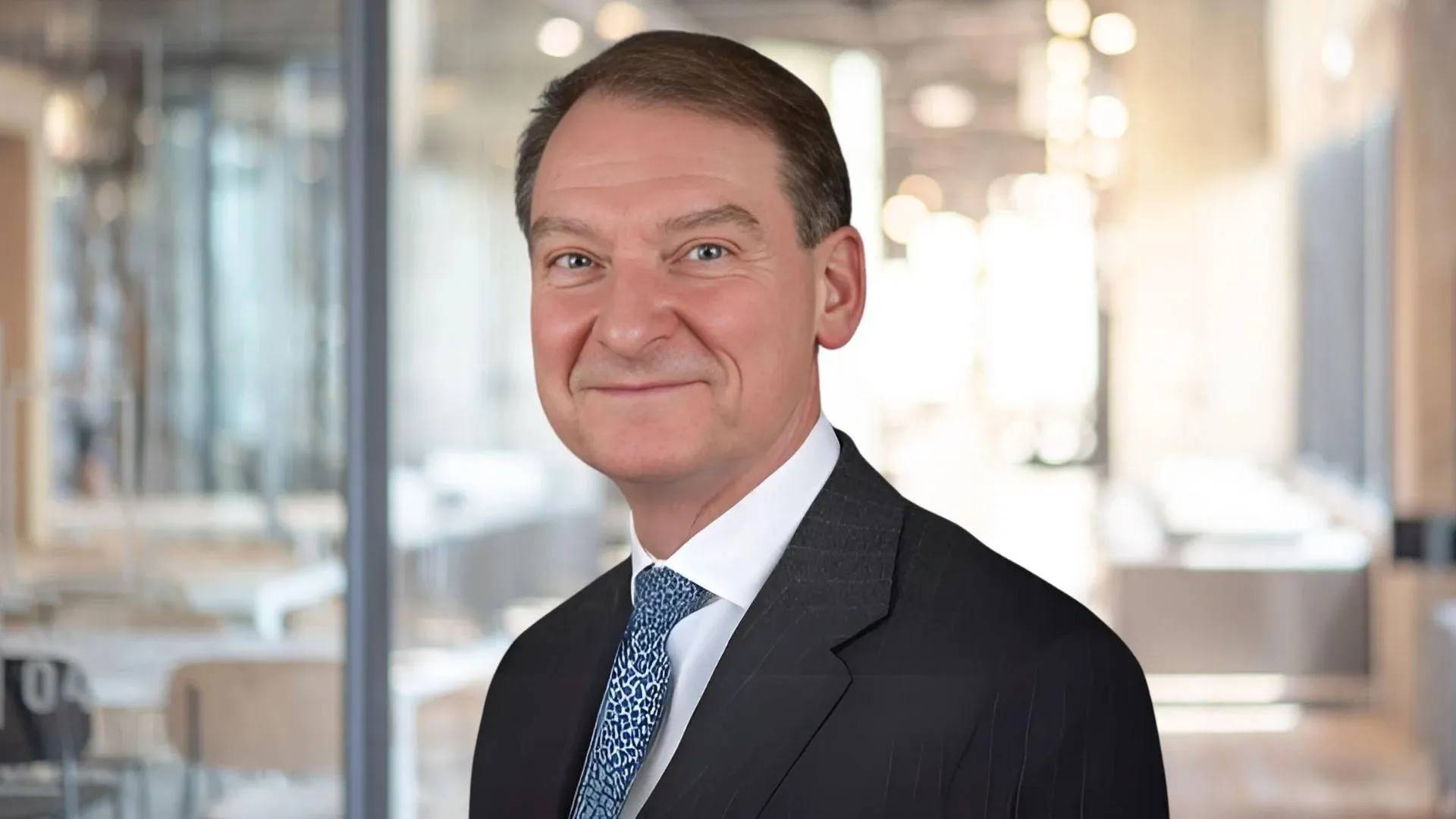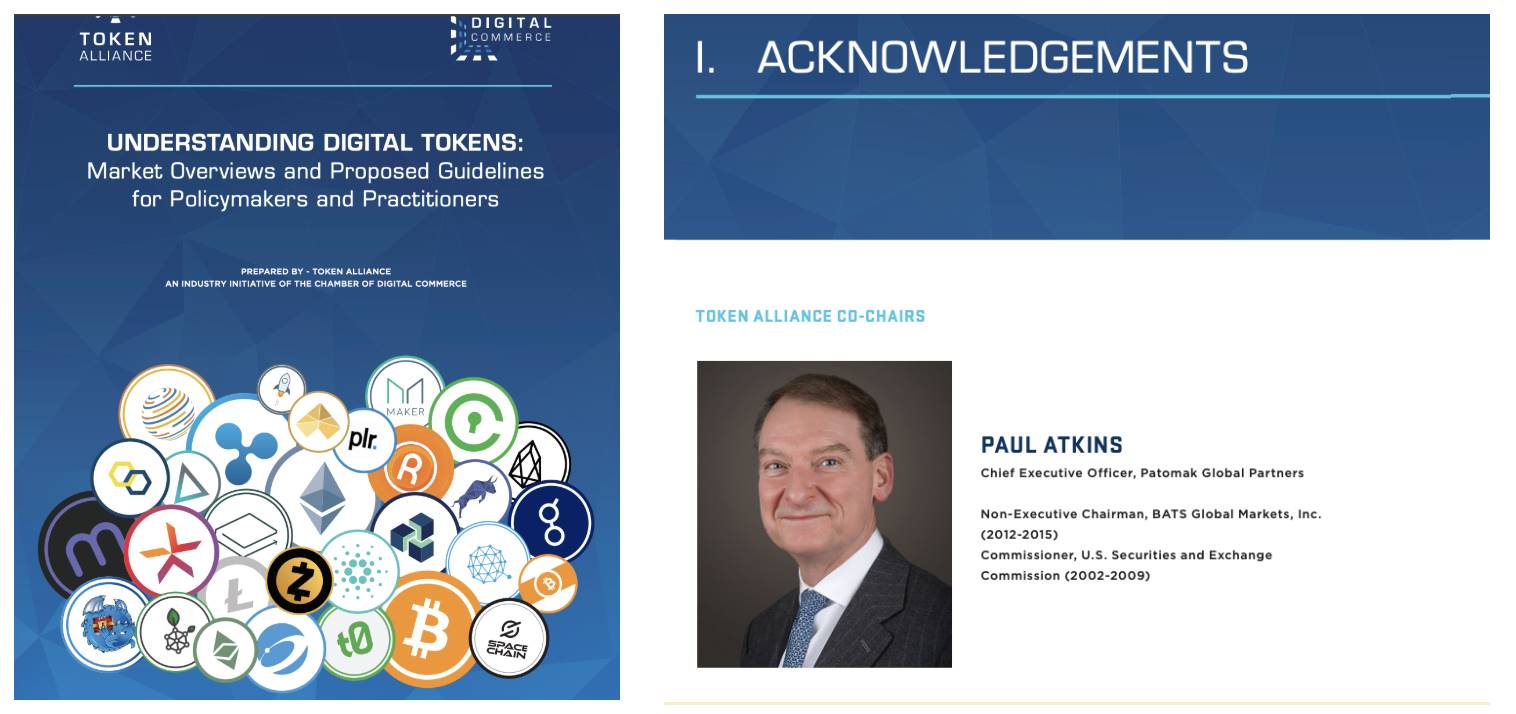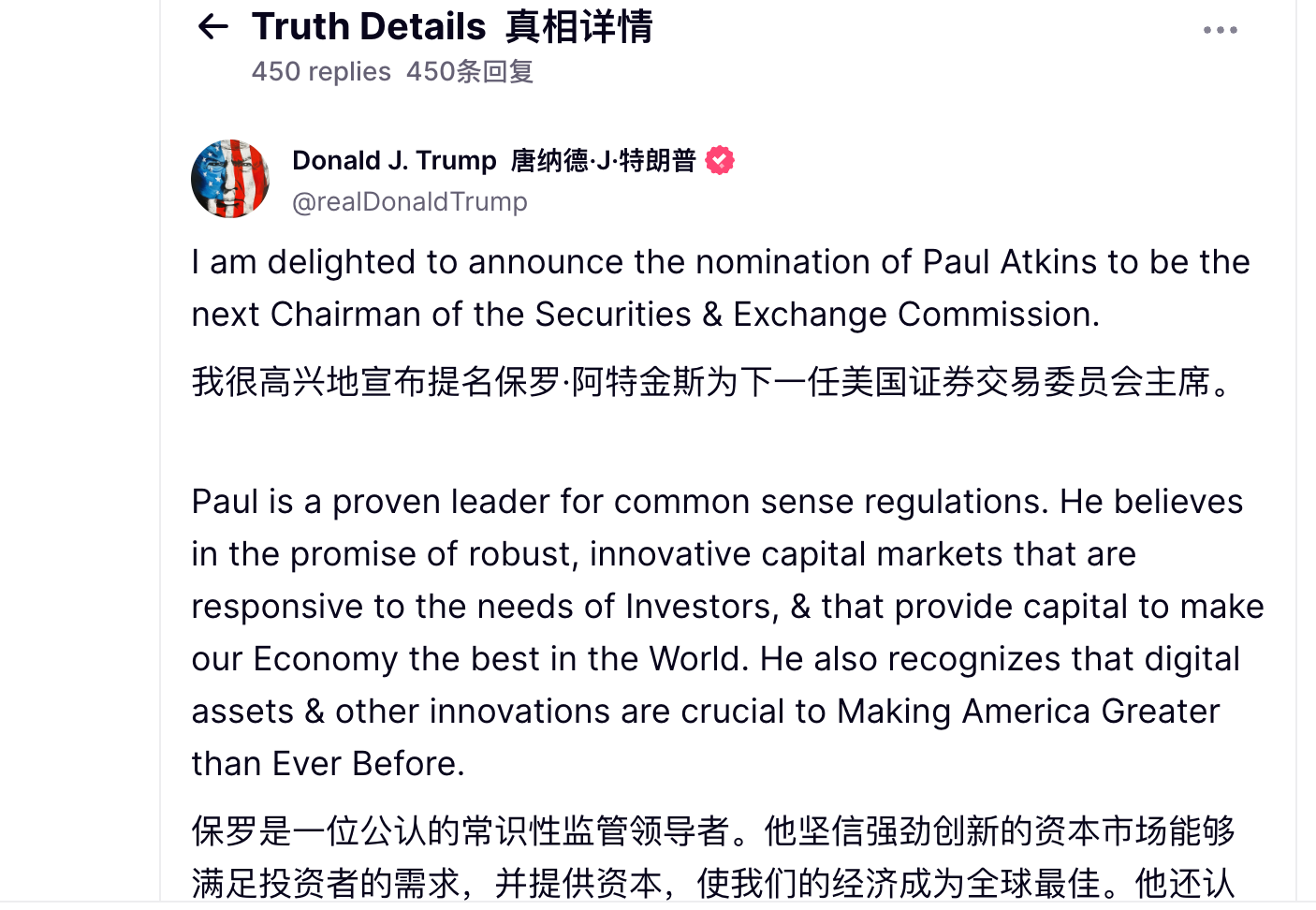The first step of the new chairman may determine the next decade of cryptocurrency in the United States and even globally.
Written by: Deep Tide TechFlow
Trump's extreme tariff policies have stirred a global market storm, with cryptocurrencies like Bitcoin searching for direction amid violent fluctuations.
Amidst the enormous uncertainty, it seems that certain good news has emerged.
On April 9, the U.S. Senate confirmed Paul Atkins as the new chairman of the U.S. Securities and Exchange Commission (SEC) with a vote of 52 to 44.
As a regulator known for supporting innovation and free markets, Atkins' appointment is seen by the crypto community as a potential turning point in the SEC's attitude towards crypto assets.
He has made it clear that establishing a clear regulatory framework for digital assets is a top priority, contrasting sharply with the tough enforcement style of his predecessor, Gary Gensler.
The crypto market is often described by regulators as the "Wild West," with frequent tensions between regulation and the industry.
However, Atkins' arrival may rekindle hopes for a more friendly and collaborative regulatory environment.
At this moment of turmoil and opportunity, Atkins' next moves are closely watched.
This new chairman, who started as a Wall Street lawyer, served as an SEC commissioner, and is now deeply involved in the digital asset space, may bring the long-awaited clarity in rules.
The answer may lie in his background.

Small Town Youth, Juris Doctor
Like most people, this new chairman was initially a studious young man from a small town.
Paul Atkins' story begins in a small town in the southeastern United States. Born in Lillington, North Carolina, he spent his childhood and teenage years in Tampa, Florida, a sunny city that laid a solid foundation for his life.
In 1980, Atkins graduated with a Bachelor of Arts degree from Wofford College, earning a spot in the Phi Beta Kappa honor society and joining the Kappa Alpha Order fraternity, showcasing his dual talents in academics and social life.
Three years later, he obtained his Juris Doctor degree from Vanderbilt Law School, serving as a senior student writing editor for the Vanderbilt Law Review.
This student job may have been the starting point for his legal and regulatory thinking, fostering a focus on legal details and a rigorous mindset.
He has been described as "quiet yet resolute." This trait stems from the humility of small-town life and incorporates a thoughtful exploration of the logic behind rules, forming a distinct aspect of his character.
Emerging from the small town of Tampa, Atkins completed his transformation from student to professional with the groundedness typical of Southern youth and the courage of a dreamer.
From Lawyer to Regulator
Paul Atkins' career began on the legal stage in New York.
After graduating from law school in 1983, he joined Davis Polk & Wardwell, a top law firm known for corporate transactions.
He focused on legal matters in the securities and financial sectors at the New York headquarters, later being assigned to the Paris office for two and a half years, where he obtained the qualification of French legal advisor (conseil juridique) in 1988.
This international experience exposed him to the complexities of cross-border financial regulation, accumulating valuable experience for his future work at the SEC.
In the 1990s, he returned to the U.S. to assist financial services companies in navigating SEC regulations and was involved in the aftermath of the Bennett Funding Group case, a $1 billion Ponzi scheme that highlighted his crisis management abilities.
Public records show that by stabilizing finances and operations and rebuilding and expanding the business, he increased the stock value for the company's remaining investors by nearly 2000%.
On July 9, 2002, Atkins' career trajectory reached a high point. He was appointed by President George W. Bush as an SEC commissioner, serving until August 1, 2008.
In the early years of his career, he served as chief of staff and advisor to SEC chairmen Richard C. Breeden and Arthur Levitt.
He became known for his support of free market principles and reducing regulatory burdens, stating in a 2007 speech: "The SEC must not push investors out of the market through heavy regulation."
After leaving the SEC in 2008, Atkins founded Patomak Global Partners, a financial services consulting firm based in Washington, D.C., and New York, focusing on regulatory compliance and corporate governance advice.
During this time, he served multiple times as an independent compliance advisor for enforcement settlements involving agencies such as the Department of Justice, SEC, and CFTC. From 2012 to 2015, he served as an independent director and non-executive chairman of BATS Global Markets, an electronic securities trading platform later acquired by the Chicago Board Options Exchange (CBOE).
His personal life also stabilized during this period, as he and his wife, Sarah Humphreys Atkins, raised three sons together. Sarah is a significant donor to the Republican Party, with contributions totaling over $9.9 million (Paul S. Atkins - Wikipedia).
From lawyer to SEC commissioner, and then to an authority in the consulting field, Atkins' career journey showcases his profound understanding of financial regulation, laying a solid foundation for his return to the SEC chairmanship in 2025.
Recognized by Trump, Also a Crypto Holder
Paul Atkins' deep accumulation in financial regulation has extended to the digital frontier with the rise of cryptocurrencies.
Since 2017, he has served as co-chair of the Digital Chamber's Token Alliance, leading this industry initiative alongside former CFTC chairman James Newsome.
The Token Alliance aims to establish best practices for the issuance and trading of digital assets, with significant outcomes including the release of the Understanding Digital Tokens: Market Overview and Guide for Policymakers and Practitioners. This report provides an overview of digital token laws in five countries and analyzes trends in token economics, aiming to promote responsible governance and reduce fraud.

His personal investments further highlight his support for digital assets.
On March 25, 2025, Fortune magazine revealed that Atkins holds up to $6 million in crypto-related assets, including shares or other investments in crypto custody company Anchorage and tokenization company Securitiz, although he does not hold Bitcoin.
These investments demonstrate his confidence in the crypto ecosystem but have also sparked controversy. On March 26, 2025, Senator Elizabeth Warren questioned potential conflicts of interest;
Atkins responded that these assets reflect his optimism about the technology's potential rather than speculative intent, which sounds a bit like how your crypto-holding buddy expresses his stance in the crypto community, doesn't it?
In terms of regulatory philosophy, Atkins also seeks to outline a clear path for the crypto industry.
For years, Atkins has consistently stated that he supports clearer regulation of cryptocurrencies to avoid stifling innovation or imposing unnecessary oversight. He has also criticized the Dodd-Frank Act enacted after the 2008 financial crisis to control large U.S. banks.
Last December, President-elect Trump stated on Truth Social that Atkins is a "recognized common-sense regulatory leader" who "understands that digital assets and other innovations are crucial to making America greater than ever before."

Iron Fist vs. Inclusiveness: The Styles of Two SEC Chairmen
If you look back at historical information, you will see that Paul Atkins and Gary Gensler represent two distinctly different paths for the SEC's regulation of cryptocurrencies.
Gensler was nominated by President Joe Biden on April 17, 2021, to serve as SEC chairman, referring to the crypto market as the "Wild West" and emphasizing tough regulation to protect investors from fraud and market manipulation.
During his tenure, the SEC approved the first Bitcoin futures ETF on October 15, 2021, but took a cautious stance on spot Bitcoin ETFs while initiating enforcement actions against several crypto companies, such as the lawsuit against Genesis and Gemini for unregistered securities offerings in January 2023. This iron-fisted style has put considerable pressure on the industry.
In contrast, Atkins was nominated by Trump and confirmed as SEC chairman on April 9, 2025, with a vote of 52 to 44, bringing a more inclusive regulatory philosophy.
In a podcast in February 2023, he stated, "If the SEC were more inclusive and could deal directly with these [crypto] companies, I think things would be better happening in the U.S. rather than abroad."
This stance continues his support for free market principles during his tenure as an SEC commissioner (2002-2008). His work with the Token Alliance and his investment of up to $6 million in crypto assets further indicate his inclination to understand and support industry development.
The regulatory philosophies of the two men form a stark contrast.
Gensler focuses on investor protection, tending to view most tokens as securities with enforcement as a priority; whereas Atkins advocates for clear rules, emphasizing collaboration with the industry, which may promote more refined asset classification.
Gensler's tough stance has sparked dissatisfaction within the industry, with Coinbase publicly criticizing his "regulatory ambiguity"; Atkins' appointment, on the other hand, has been welcomed, with CoinDesk calling it a "victory for the crypto industry."
This shift from an iron-fisted approach to inclusiveness signals a significant turning point in the SEC's regulatory direction.
It is worth reiterating that the new SEC chairman has made it clear upon taking office that establishing a comprehensive regulatory framework for digital assets is a top priority; based on his experience with the Token Alliance and investments in companies like Anchorage and Securitize, he may push to clarify which crypto assets constitute securities, simplify the issuance registration process, and create a more favorable environment for crypto financial products.
Optimistically, this framework could end the long-standing regulatory ambiguity, potentially leading to a breakthrough in the approval of spot Bitcoin ETFs.
However, given Trump's unconventional approach and the perception of treating the crypto industry as a tool, it remains uncertain how many beneficial actions the SEC chairman can take.
Regardless of the outcome, his regulatory blueprint will become a focal point for the crypto industry. The first step of this new chairman may determine the next decade of cryptocurrency in the United States and even globally.
免责声明:本文章仅代表作者个人观点,不代表本平台的立场和观点。本文章仅供信息分享,不构成对任何人的任何投资建议。用户与作者之间的任何争议,与本平台无关。如网页中刊载的文章或图片涉及侵权,请提供相关的权利证明和身份证明发送邮件到support@aicoin.com,本平台相关工作人员将会进行核查。



